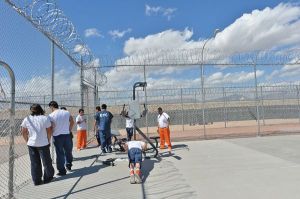Results 1 to 1 of 1
Thread Information
Users Browsing this Thread
There are currently 1 users browsing this thread. (0 members and 1 guests)
-
01-05-2014, 10:32 PM #1
Immigration case backlog swells in El Paso
Immigration case backlog swells in El Paso
Susan Waller Ramos

Bio BoxTop Texas Immigration Court Backlogs
Source: Transactional Records Access Clearinghouse, Syracuse UniversityLocation Pending Cases Average Wait Days Houston 16,647 555 days San Antonio 12,401 355 days El Paso 7,792 540 days Harlingen 7,095 229 days Dallas 5,262 417 days
El Paso’s Growing Immigration Backlog
Source: Transactional Records Access Clearinghouse, Syracuse UniversityFiscal Year Pending Cases Average Wait Time 2008 1,808 86 days 2009 2,990 161 days 2010 4,599 230 days 2011 5,673 335 days 2012 6,888 424 days 2013 7,304 436 days 2014 7,792 540 days
Posted: Sunday, January 5, 2014 6:00 pm
By Robert Gray El Paso Inc. staff writer
A shortage of judges to handle immigration cases is causing crowded dockets in El Paso and across the nation.
As a result, cases are piling up at El Paso’s immigration courts, and the time it takes to get a first hearing is growing longer and longer.
As 2013 came to a close, the backlog of cases and wait times had swelled to a new high in El Paso, following five years of rapid growth in the number of cases pending before the immigration courts here. “For the most part, it is a very frustrating thing for people who want to get out of court and move on,” said El Paso immigration lawyer Susan Waller Ramos, senior counsel at Cox Smith.
The number of cases awaiting a hearing at immigration courts in El Paso is up 331 percent since fiscal year 2008, growing from 1,808 to 7,792, according to case data compiled by the nonprofit Transactional Records Access Clearinghouse, or TRAC, at Syracuse.
The immigration case backlog in El Paso is among the worst in Texas, which has one of the worst backlogs in the nation.
People scheduled for hearings now wait 18 months on average. And the average time from when a case is filed to when it is closed has stretched from just 86 days in 2008 to 540 days, the data show.
Ramos told El Paso Inc. she has some immigration cases right now scheduled in court for November 2015, and she is advising new clients that they could have to wait as long as two years for their case to come up after their initial bond hearing.
“They are stuck in this limbo where they can’t get on with their lives,” Ramos said.
For those who are detained while they wait for their hearing, the long wait times can also mean extended detentions that are costly to taxpayers.
As of November, Texas ranked third in the nation with 50,927 pending cases, behind California and New York.
And in Texas, El Paso ranked third with 7,792 pending cases, after Houston and San Antonio, according to the TRAC data.
Statewide, hearing wait times in El Paso were second only to Houston. El Paso had an average wait time for current pending cases of 540 days in November. Houston had a wait time of 555 days, the data show.
“In some cases, it is very frustrating for clients who really want an end to their case. Other clients are relieved by the wait because it buys them some time,” Ramos said.
6 judges
The immigration court in El Paso, one of the nation’s 59 immigration courts overseen by the Executive Office for Immigration Review, has two locations here.
The agency has assigned two judges to the El Paso Immigration Court in Downtown at 700 E. San Antonio.
There are four judges assigned to the immigration court located inside the detention facility operated by U.S. Immigration and Customs Enforcement at 8915 Montana, adjacent El Paso International Airport.
Those judges handle cases involving people locked up by the Department of Homeland Security. The judges determine whether people should be permitted to enter the United States or deported.
They also have jurisdiction to consider applications for relief from removal, including asylum, adjustment of status and cancellation of removal.
Officials with the Executive Office for Immigration Review have long acknowledged the need to hire more judges, according to a recent report in the Houston Chronicle.
“The agency is aware of the backlog and are doing their best to reduce it,” Doug Stump, president of Washington, D.C.-based American Immigration Lawyers Association, told El Paso Inc. “A lot of the problem has to do with the budget issues in Washington. They just can’t get the funds released to hire a sufficient number of immigration judges.”
Since 2009 the number of judges nationwide has grown from 237 to 252, while the number of cases on the docket has swelled from more than 223,000 to nearly 350,000, according to the Houston Chronicle report.
“I do not see any immediate relief to the system,” Stump told El Paso Inc. “It is going to continue to get worse before it gets better.”
In the meantime, Stump said, some immigration lawyers are stepping up efforts to get video statements from witnesses who may move away or die before hearings, and the immigration lawyers association is lobbying Congress to provide funding to fill vacant positions.
“I wish Congress would buckle down,” Stump said. “Ultimately, Congress bears the full brunt of the responsibility for where we sit today.”
http://www.elpasoinc.com/news/local_...a4bcf6878.html
NO AMNESTY
Don't reward the criminal actions of millions of illegal aliens by giving them citizenship.
Sign in and post comments here.
Please support our fight against illegal immigration by joining ALIPAC's email alerts here https://eepurl.com/cktGTn


 LinkBack URL
LinkBack URL About LinkBacks
About LinkBacks




 Reply With Quote
Reply With Quote


We must push through early Thurs at this critical moment
04-24-2024, 10:44 PM in illegal immigration Announcements